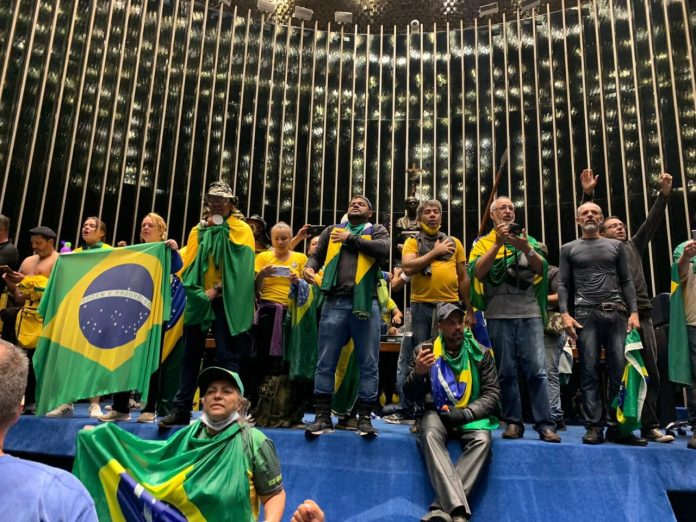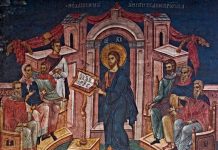On January 1, Brazil recognized its new president, a socialist. Luiz Inacio Lula da Silva was sworn in with an elaborate inauguration ceremony before a crowd much smaller than any of those supporting his populist opponent, Jair Bolsonaro, who had served a president for four years.
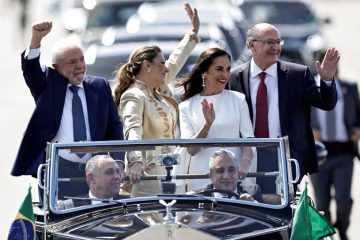
Lula’s swearing in was the result of an October 31 run-off election. But the final tally was so tight that allegations of voter fraud and massive demonstrations erupted across the country, prompting Sebastião Coelho, former vice president of the Regional Electoral Court, to call for the arrest of Supreme Court Chief Justice Alexandre de Moraes for pressing forward with certifying the election. Declared Coelho: “More than 80% of judges in Brazil, at first and second instances, do not agree with what the Federal Supreme Court is doing.”
Nor were huge numbers of Brazilians content with Lula or his criminal record, dating back to 2017 when he was convicted of corruption for his part in Operation Car Wash, a money-laundering scandal which brought down dozens of politicians and business leaders across Brazil in a unanimous vote by 19 judges. But according to investigative journalist, Matthew Tyrmand, that didn’t stop Lula’s Supreme Court appointees from eventually overturning his multiple sentences, freeing him to run for a third term as president – despite a Brazilian law prohibiting a convicted felon from running for office.
Says Tyrmand: The judges put Lula “on the chessboard so they could attempt to control the outcome of the election. And now the people, en masse, are crying foul … and even marching in the districts where the socialist supposedly has strongholds, such as the Amazon.”
In early December, Bolsonaro filed a petition with election authorities formally contesting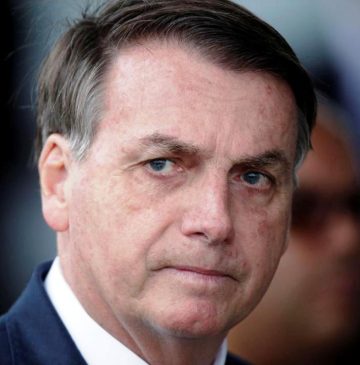 the results, alleging some voting machines malfunctioned and that any votes cast through them should be annulled. Meanwhile, the massive protests continued daily but were largely ignored by establishment media across the West.
the results, alleging some voting machines malfunctioned and that any votes cast through them should be annulled. Meanwhile, the massive protests continued daily but were largely ignored by establishment media across the West.
“This is possibly the largest democratic protest in human history,” Tyrmand told Tucker Carlson on Fox News. “And the global media is crickets on this.” What’s also clear, he added, is that the Brazilian people “don’t want to be led by a convicted criminal.”
Lula’s Leftist history
Voters familiar with Lula’s political history have reason to be suspicious. In 1990, just as the Soviet Union appeared to be collapsing, the pro-communist Sao Paolo Forum was created. This was when Cuban dictator Fidel Castro reached out to Lula da Silva of the Workers Party of Brazil to oversee the Forum which soon became an international movement of many leftist groups, parties and individuals in the region – including Cardinal Arns, an adept of Liberation Theology, friend to the Castro brothers and supporter of Lula, the Marxist, as president of Brazil from 2003 to 2010.
In the current campaign, however, Lula did not achieve the vast crowds Bolsonaro did. And Brazilians were subsequently enraged by Lula and his officials’ refusal to hand over voting machines, codes and tabulation data that would confirm the election had been fairly conducted.
Bolsonaro refused to concede the election and the largest peaceful demonstrations in history continued apace across Brazil. And despite the media’s dismissive claims that Bolsonaro was wrong about Lula posing a totalitarian threat to Brazil, many Bolsonaro supporters were in sympathy with their president’s second consecration of Brazil to Mary, Queen of Heaven and Earth.
Then, on December 29, after failing to compel sufficient members of the military to formally challenge Lula, Bolsonaro flew to Orlando, Florida, with his family to ponder his next move and to see if he will face prosecution for his claims the election was stolen.
Two days later, Lula was sworn in and Brazil dropped from the front pages.
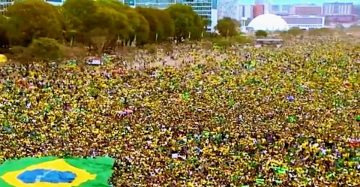 On January 8, however, the hammer dropped in Brasilia, the nation’s capital, where tens of thousands of demonstrators descended on the National Congress, the Supreme Federal Court and the Planalto Palace demanding proof the election had been fair.
On January 8, however, the hammer dropped in Brasilia, the nation’s capital, where tens of thousands of demonstrators descended on the National Congress, the Supreme Federal Court and the Planalto Palace demanding proof the election had been fair.
Yet Lula, who’d fled to Sao Paolo, would not comply with the law. The information required by the military for its report on the election’s legitimacy was still missing. And to stop the protests demanding Lula’s compliance, the courts began ordering the arrests of anyone protesting or daring to say the election was stolen.
In lockstep, international media also declared that Bolsonaro’s ‘coup’ had failed and that ‘Democracy’ had been ‘saved’. And, as with the January 6 insurrection in Washington two years earlier, demonstrators were swiftly arrested in their hundreds using a now-routine template designed to convince the public no fraud occurred, that votes were sacrosanct and justice was being served. Or else.
Yet the opposite appears to be true. As is a dawning understanding that a pattern is now being established and possibly normalized – the manipulation of democratically cast ballots through multiple methods of electronic and technocratic fraud now known as ‘shenanigans’.
Will Brazil ever have another free election?
But what does this really mean geopolitically? It means that communism is unchanged. This ever-expansionist ideology bent on world domination remains as it always was. It didn’t disappear at the end of the Soviet Union. And its triumph continues to entail the destruction of every liberty, intellectual as well as political, that we in the West hold sacred yet take for granted – above all, the absolute value of the single human person. And Latin America has just taken – or been forced to take – a major step towards becoming a continental Socialist super-state backed by the Chinese communist party as it claims yet another land mass for international communism.
This has always been part of the ultimate goal of the Marxist-Leninist creed which has always been to obliterate all memory of Jesus Christ, Christendom, Catholicism and Salvation History itself. Just as Our Lady warned at Fatima in 1917. And which now looks close to becoming an international reality as the dominos of the natural order and the moral order fall one by one. As planned.
The Communist Manifesto
And as declared in The Communist Manifesto by Karl Marx and Friedrich Engels, published in 1848 as the handbook for total revolution against the entire natural and moral order.
Yet even before the world had any notion of it, Holy Mother Church was fully aware of the threat. Two years before the Manifesto appeared, the first encyclical of Pope Pius IX (1846-1878) Qui Pluribus, was released, vehemently denouncing communism and confirming the centrality of the Catholic Church to Western civilization. Indeed, long before Russia was seized by Bolshevism in 1917, it was the Roman Catholic Church only that foresaw the scourge of atheistic communism and denounced it as “absolutely contrary to the natural law itself” and predicted that its pestilential doctrines would be spread everywhere, depraving minds in its path.
“As a result of this filthy medley of errors, we see morals deteriorated, Christ’s most holy religion despised, the majesty of divine worship rejected, the power of this Apostolic See plundered, the authority of the Church attacked and reduced to base slavery, the rights of bishops trampled on and the sanctity of marriage infringed,” Pius wrote.
His successor, Pope Leo XIII, followed in 1878 with Quod Apostolici Muneris (On Socialism) which defined communism as “the fatal plague which insinuates itself into the very marrow of human society only to bring about its ruin.”
“We speak of that sect of men who, under various and almost barbarous names, are called socialists, communists, or nihilists and who spread, over all the world, and bound together by a wicked confederacy, no longer seek the shelter of secret meetings but, openly and boldly, marching forth in the light of day, strive to bring what they have long been planning — the overthrow of all civil society.”
The encyclical warnings continued over the following decades before and after Our Lady’s call at Fatima for the consecration of Russia to her Immaculate Heart.
Then, in 1931 Pius XI’s Quadragesimo Anno warned that “Religious socialism, Christian socialism, are contradictory terms; No one can be at the same time a good Socialist and a good Catholic.”
Divini Redemptoris followed in 1937 at the height of the great Stalinist Terror, warning that the notion of ‘Christian Marxism’ was an oxymoron and that communism was an evil of the spiritual order constituting class warfare and causing rivers of blood to flow.
Was the Holy Father anticipating the Liberation Theology that would emerge two decades later? Despite Pius XII historic Decree Against Communism which officially excommunicated any Catholic who joined the Communist Party, published or distributed Communist publications, received the sacraments while involved in either of the first two or who professed, promoted or defended materialistic Communist doctrine? And despite Vatican II documents defining communism as a ‘pseudo-religion’, an ideology that promotes an end-times/utopian like vision of heaven on earth and poses an exceedingly grave and universal danger to the world?
Here again was Holy Mother Church`s uncompromising view of an old and eternal enemy.
Liberation Theology
Yet almost without notice, the world of Liberation Theology was emerging too. Having its origins in Latin America in the mid-1950s, its focus has always been on shifting the Church towards a more socially-oriented gospel, focused not on salvation but through the lived experiences of oppressed people seeking to escape poverty through a gospel where Jesus Christ becomes the “liberator” calling for reorganization of social, governmental, and economic structures that, in truth, result not in Christian charity and redemption but socialism.
In Latin America in the 1960s and 1970s, however, poverty was common, countries were heavily Catholic, and ‘Vatican II’ (that is, a misinterpretation thereof) appeared to be pivoting the Church towards progressive ways of thinking as Communist revolutions sparked false hope for impoverished people around the world.
Into this environment, Catholic theologians began introducing a theology bringing together Marxist social analysis with biblical teachings about God’s care for the poor. Most closely associated with the movement was a Peruvian friar named Gustavo Gutiérrez, who published A Theology of Liberation: History, Politics, and Salvation in 1971. Gutiérrez explained his liberation theology view of history’s goal not as the glorious return of Jesus to rescue us from evil but as a permanent cultural revolution.
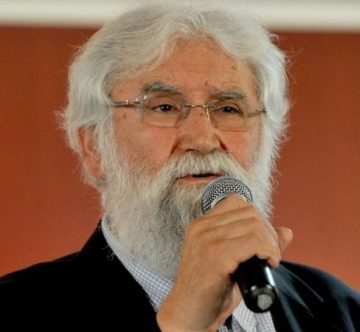 Equally well known in this movement was Leonardo Boff, a former Franciscan priest, academic and friend of Lula who left the priesthood in 1992 after Rome forbade him from participating in the Eco-92 Earth Summit in Rio de Janiero. At the time, media reports said Vatican authorities did not consider Boff’s views of the Church’s leadership acceptable. They also criticized his affinity for Marxism and regarded his support of liberation theology as having “politicized everything”.
Equally well known in this movement was Leonardo Boff, a former Franciscan priest, academic and friend of Lula who left the priesthood in 1992 after Rome forbade him from participating in the Eco-92 Earth Summit in Rio de Janiero. At the time, media reports said Vatican authorities did not consider Boff’s views of the Church’s leadership acceptable. They also criticized his affinity for Marxism and regarded his support of liberation theology as having “politicized everything”.
KGB Influence
However, the above is only part of the story of the virulent spread of this seductive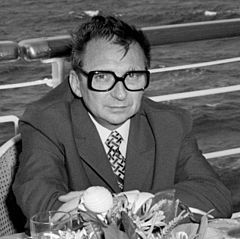 theology. A few years ago, former communist spy chief, Ion Mihail Pacepa, published a history of its deeper roots and what many believe is its true origin – Moscow.
theology. A few years ago, former communist spy chief, Ion Mihail Pacepa, published a history of its deeper roots and what many believe is its true origin – Moscow.
“Liberation theology, of which not much has been heard for two decades, is back in the news,” wrote Pacepa in 2014. “What is not being mentioned is its origins. It was not invented by Latin American Catholics. It was developed by the KGB. The man who is now the head of the Russian Orthodox Church, Patriarch Kirill, secretly worked for the KGB under the code name ‘Mikhailov’ and spent four decades promoting liberation theology, which we at the top of the Eastern European intelligence community nicknamed `Christianized Marxism`.”
While Liberation theology has been generally understood to be a marriage of Marxism and Christianity, he stated, what has not been understood is that it was not the product of Christians pursuing Communism, but of Communists pursuing Christians, as outlined in his book Disinformation. Its genesis was part of a highly classified Party/State Disinformation Program, formally approved in 1960 by KGB chairman Aleksandr Shelepin and Politburo member Aleksei Kirichenko, then the second in the party hierarchy after Nikita Khrushchev.
In 1971, the KGB sent Kirill to Geneva as emissary of the Russian Orthodox Church to the World Council of Churches (WCC) which, in 2014, was still the largest international religious organization after the Vatican, representing some 550 million Christians of various denominations in 120 countries.
“Kirill/Mikhailov’s main task was to involve the WCC in spreading the new Liberation Theology throughout Latin America. In 1975, the KGB was able to infiltrate Kirill into the Central Committee of the WCC — a position he held until he was ‘elected’ patriarch of Russia in 2009. Not long after he joined the Central Committee, Kirill reported to the KGB: ‘Now the agenda of the WCC is also our agenda.’”
According to Pacepa, with Kirill at the helm of the WCC, liberation theology put down deep roots in Latin America and the map was steadily turning red. In 2014, Russian military ships and bombers were back in Cuba for the first time since the 1962 Cuban missile crisis, and Russia had sent ships and bombers to Venezuela which had joined the communist fold, joining Bolivia and Nicaragua while wooing as many others as possible.
Nor was Pope John Paul II, who knew the Communist playbook well, taken in by the Soviets’ liberation theology. In 1983, his trusted colleague Cardinal Josef Ratzinger (later Pope Benedict XVI), who at that time was head of the Vatican’s Congregation for the Doctrine of Faith, discarded as Marxist the liberation-theology idea that class struggle is fundamental to history. The cardinal called liberation theology a “singular heresy” and blasted it as a “fundamental threat” to the Church.
Which it was and remains. A threat deliberately designed to undermine the Church and to destabilize the West by subordinating religion to an atheist political ideology for its geopolitical gain. And little has changed, though the current promoters of this KGB-inspired religious ideology, which once embraced violent Marxist revolution, continue to deny its link to Marxism and to the KGB, now the FSB.
An Unchanging Playbook
Their methods of taking power over entire populations remain the same and still follow Lenin’s diktats for creating social upheaval, as itemized by Russian émigré Alexandre Markovsky: “Cause the problem, spread the misery, utilize every manifestation of discontent. Send cadres of community organizers to unite the angry and disinherited spirits to fuel an organized revolt. Encourage violence. Exploit chaos for larger political objectives. Blame your political opponents, demonize and criminalize them.”
And if you can enlist impassioned Christians and clergy to the cause, success is all but guaranteed. At least superficially.
In 1984. the Congregation for the Doctrine of the Faith, led at the time by Cardinal Ratzinger, condemned liberation theology because of its use of Marxist principles and its association with political movements. Yet thirty years later, the Vatican appeared to be warming to liberation theology insofar as this virus was by then rarely if ever mentioned.
Then, in February 2014, at the invitation of the Prefect of the Congregation for the Doctrine of the Faith, Cardinal Gerhard Ludwig Mueller, Gutiérrez was invited to the Vatican and reportedly received a hero’s welcome.
Plus, after a long silence on the movement, the Vatican newspaper L’Osservatore Romano declared that after Francis’ election that liberation theology can no longer “remain in the shadows to which it has been relegated for some years, at least in Europe.”
St. Paul’s Warning
Today, after three years of Covid pandemic and Climate Change propaganda and the unexpected exposure of the totalitarian and de-populationist ambitions of globalist elites, frightened citizens around the world are suddenly awake to what the recent election in Brazil may actually mean. Which does not appear to be good news for Brazilians whose election must now be proven to be ‘unstolen’ and who, like so many other Christians around the world, are watching darkness descend inexorably. And sensing that, just as their recently contested elections are producing jailed voters languishing in prisons, St. Paul’s Epistle to the Ephesians seems more relevant than ever: “For our wrestling is not against flesh and blood; but against principalities and power, against the rulers of the world of this darkness, against the spirits of wickedness in the high places.”
And those powers and principalities are now on the move! As if their time was suddenly short.
Archbishop Fulton Sheen
Since its inception, all popes have implacably denounced communism in the direst and most direct language possible.
But Archbishop Fulton Sheen may have been among the most powerful, the most explicit. Writing and broadcasting at the height of the Cold War in the 1950s, Sheen enlightened the world with unforgettable clarity and simplicity.
Calling communism “the groan of despair,” Sheen wondered out loud: “Why can’t the modern mind see there is nothing new in communism?” Or that communism has produced the largest graveyards in human history?
Calling the Soviet Union “the most anti-Christ nation on the face of the earth,” he told a Lenten crowd it was fitting that Soviet communism’s emblem was “a rotted corpse, the body of Lenin—a perfect symbol to which all communism must lead us all, unto dust, unto dissolution, unto death.”
And it’s all generated by atheism where communism begins: “Atheism is not natural,” Sheen said. “Take heart that Christ’s tomb is empty, while Lenin’s tomb is not.”
In the end, we were promised at Fatima that Our Lady’s Immaculate Heart will triumph. Bolsonaro knew this when he consecrated Brazil to her. Twice. With a public prayer which will not go unanswered. Or unassisted.
Coda to Fatima
But here too is a coda I find irresistible. It’s from James Burnham and his classic book Suicide of the West. In it, he recalls how, when he was researching his book, his attention was suddenly drawn by an atlas from the 1920s. Poring through the maps, captivated, he noticed a striking and unavoidable fact. All the maps beginning from 700 AD covered an ever-expanding landmass thriving under the culture of Western civilization. Right up until the First World War.
Then suddenly, as on a knife edge, it all changed.
“It was with Russia that the process of the political and geographic disintegration of the West began,” Burnham wrote in 1965. “However we may describe Russia’s relation so the West prior to 1917, the Bolsheviks at the end of that year broke totally away.”
And never returned.
“The trend, the curve is unmistakable,” Burnham continues. “Over the past two generations, Western Civilization has been in a period of very rapid decline, recession or ebb within the world power structure.” And he provides much detail to confirm his findings. All fascinating.
Does this unforeseen contraction of the West not coincide exactly – exactly – with Our Lady’s appearance at Fatima and her predictions?
Bolsonaro appears to understand exactly what his country’s problem is and has been suffering because of it. Pray the rosary daily for Brazil and its 200+ million citizens, and for the Conversion of Russia, as requested by Our Lady.

